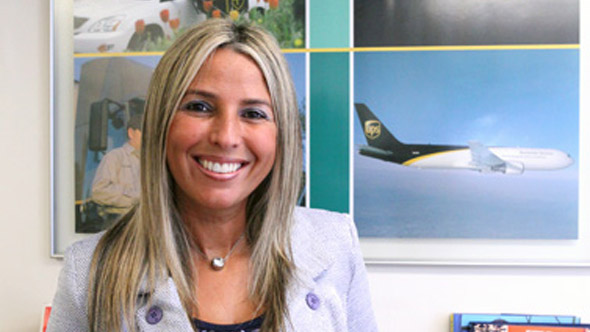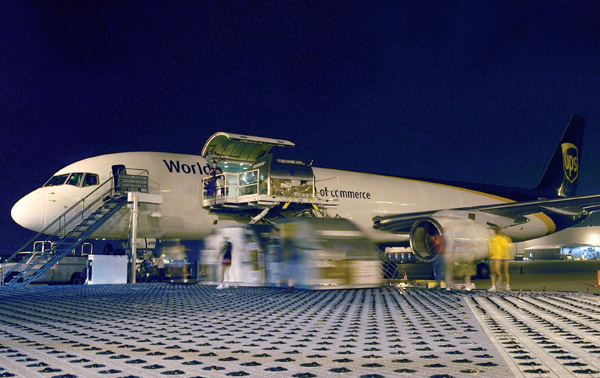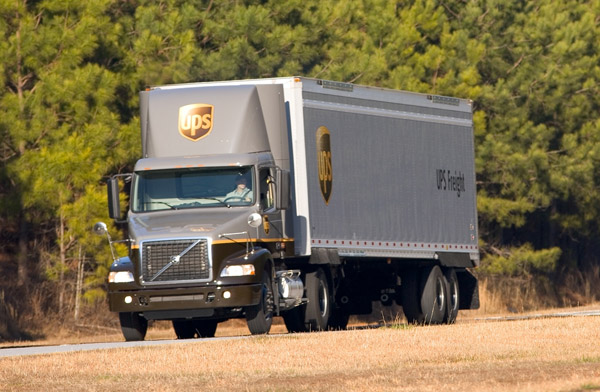Brazil’s Logistics: Trends in the Brazilian Logistics Sector
Nadir Moreno, Country Manager at UPS, talks about the logistics sector in Brazil. She also talks about UPS Brazil, the operations that are being taken care of by the company, her strategy and vision for the years to come, and mentions some of the challenges the giant corporation has to face.
Interview with Nadir Moreno, Country Manager at UPS Brazil

What is the outlook for the logistics sector in the emerging markets and in Brazil?
UPS’s headquarter in Brazil is in São Paulo and our main operations are located in the city of Campinas. Today, we serve the entire country, but 12 offices and operational centers offer our own structure, while in other places of the country we count on a few partners. We have over 600 direct employees and 3,000 indirect employees in Brazil.
The perspectives are very positive due to the fact that Brazil today is both the ‘country of the future’ and ‘of the present’. It’s a country of opportunities also for the logistics sector when taking into account the emergent countries such as China and India. Our growth expectations are positive and Brazil has grown significantly in between 2010 and 2012. Historically, the increase of the logistics sector has a direct relation with the increase of the Gross Domestic Product (GDP). Lately, the logistics sector has proved that its growth can surpass the GDP growth; in average 8% to 10%. There are three reasons for that to occur.
First, companies are outsourcing their activities to global logistics providers in order to spend time focusing on their main activity. Second: nowadays, logistics vendors offer complete solutions in diverse segments. For instance, in the healthcare & pharmaceutical sectors, companies are counting on logistics companies like UPS to take care of their inventory, storage, and distribution in order to have more time to focus on finding new solutions for diseases. This is what is expected in this market today: they have to let us provide solutions when it comes to activities that are not top-priority for them. And thirdly, investments in logistics infrastructure will also be a focus in the coming years.
What are your thoughts on the future trends in the global logistics sector (could we see more competition, buyouts, mergers, rise of new competitors from the emerging markets, or rise of new type of companies)?
This is an excellent question. We can say that acquisition was the way that companies of the sector found to grow. However, over the years, acquisitions have had different ultimate goals. For example, in the case of UPS, the biggest logistics company in the world, there were two big moments. Until 2005, UPS acquired many big global companies such as Challenge, in order to obtain a license to fly in the entire Latin America. Also, there were purchases of transportation companies and the acquisition of Overnight and UPS Capital (former First International Bank). UPS was building its portfolio to become a complete logistics provider, including the bank sector.

After the year 2005, UPS started to make acquisitions more locally and investments toward an organic growth. For instance, UPS acquired one specific Italian company, the Pieffe, devoted to the health care sector because of local and specific market needs in Italy. In 2009, we invested directly in our domestic market in Brazil, and in 2011 another strong investment was made to open 8 operational centers to keep up with local demands.
We built portfolio, built capacity, and started offering a much more customized customer service in Brazil, bringing out efficiency – the core of UPS services. There were gains in important aspects in the logistics sector: transit time, once we use our own infrastructure and offer tracking and great pickup deadlines. In our sector, one minute is a determinant factor. Agility and reliability are crucial in this business. UPS became the standard in the market.
Recently, we have noticed local acquisitions made by one of our competitors in Brazil in order to cover the country geographically, taking into account its continental size.
How would you characterize your strategy over the next 5 years?
My strategy today is no different from 5 years ago. I’ve been the country manager of UPS Brazil for 5 years, but next October I’ll have accumulated 20 years working for UPS. UPS is 105 years old but its strategy since it was born has been the same: to grow the business with profitability. How can you accomplish this? By making sure that services, products, and employees are in alignment with the corporate strategy. We’ve been growing significantly in the last five years, always reaching a two-digit increase mark, even during the 2008 crisis. Our country didn’t show any decrease, on the contrary. The growth probably will maintain steady over the next five years. Today we pursue growth by expanding our operations in Brazil and in specifics areas such as healthcare.
With that, the company opened a 5,000 m2 warehouse in Aparecida de Goiania, in Goiás state, to clients of the healthcare sector. In general, states’ governors are coming up with projects to attract big corporations to settle and to invest in the development of their particular regions. UPS is accompanying the investments made in the country. Brazil is in a great position to draw in big investments.
Can you briefly describe your operation in Brazil (number of employees, growth, number of branches, dynamics, services, largest clients, corporate vs. individuals)?
UPS Brazil was established in 1989, through a representative, and in 1995, UPS established a branch in Brazil with the segment of express delivery. After the acquisitions, when it became a giant corporation in the logistics sector, UPS started incorporating all its international solutions: courier, freight forward, logistics, distribution, e-cargo/by plane, and capital, the latter related to the bank sector, to give support to medium businesses to import machinery through lines of credit.
UPS’s headquarter in Brazil is in São Paulo and our main operations are located in the city of Campinas (considered to be the UPS hub in Brazil). Over there we have two UPS Boeings 767 of our own (flying Campinas, Miami, Ezeiza, in Argentina, and Bogotá, in Colombia). Today, we serve the entire country, but 12 offices and operational centers offer our own structure, while in other places of the country we count on a few partners. We have over 600 direct employees and 3,000 indirect employees in Brazil.
In the last year, UPS performed an expansion plan in Brazil with objective of bolstering its customer offering across the country. Eight new UPS facilities were launched throughout Brazil, increasing the company’s domestic network to 12 small package operation centers on major cities, covering 110 cities across the country. The ground fleet, personnel and routes were expanded to serve the new cities, and now, UPS serves 47% of Brazilian GDP.
How important is Brazil for UPS and what role is your operation in Brazil going to play in your strategy?
Brazil was always very important. After the crisis, all international countries became even more important. Before, great part of UPS business took place in the United States, only 30% being handled outside. After the crisis, we’ve seen the change on the focus in order to keep growing and Brazil was part of this strategy along with China, Russia, India, and other countries. After the crisis, Brazil has been in high-demand. The whole globe (including small, medium, or big corporations) is looking for solutions and forms of making business with Brazil.

Brazil is a key market for UPS in Latin America and UPS is committed to providing Brazilian companies with access to international trade, offering a complete portfolio of solutions from small package to freight, logistics, brokerage and financing to help Brazilian businesses grow both locally and globally.
How do you define your major challenge? What are the external and internal challenges that could hamper your development and growth?
Challenges are always around, but when you work for a powerful company such as UPS the challenges become smaller. I consider myself lucky to manage a top notch company. My main asset is people. So, I have to retain my employees, always providing training and numerous qualification programs and opportunities inside the company to maintain our turn over very low or equal to zero. With our continuous growth, we also need more qualified professionals to hire. This is the challenge: to find qualified workforce to keep up with rapid market demands.
Because we are a logistics company, we face some challenges related to infrastructure. But there is a willingness to improve Brazilian infrastructure, especially because of the big events we’ll soon host such as the World Soccer Cup. We’ve seen that there’s commitment along with actions in both the public and private sectors.
Our clients include B2B and B2C; they are global and local. Usually, clients are looking for a solution and knock at our door. We’ll offer an integrated solution and this is one of the biggest differentials of UPS. You can even find competitors with a complete portfolio, but not necessarily with integrated solutions. I have professionals who can detect the needs of the clients and design the best solution possible in terms of the best price, deadline, and so forth. We always can offer many different options to our clients. We cover all means of transportation (by land, sea and sky).
We are prepared for the pre and post business. We are very focused on client retention, aiming for a long term relationship with the client. Recently, we’ve been gaining more market share by offering excellent customer service.
We are also interested in doing business with small and medium-sized ones to guide them through import and export laws, providing them with consultancy as well. We are helping them open international doors for their business. And also, we connect 220 countries to Brazil and vice versa.
What environmental initiatives are you to undertake in the future that will bring pioneering concepts in the industry?
UPS is very concerned about the environment and has many internal programs and initiatives. For instance, the project UPS carbon neutral was implemented in various countries. When clients join this program, the amount collected is redirected to specific environmental projects (i.e.: the first purchase of carbon offsets was in the Garcia River Forest Climate Action Project, CA, USA). UPS also hold abroad a paperless program, devoted to technology and automation. We also use cars with alternative fuel.
Also, we take small, preventive measures. It’s forbidden to start off the car for idling, if the driver is not immediately leaving to go on a route. It seems something small, but when you take into account that there are 115,000 UPS drivers in total around the globe, we can see the bigger picture and how significant these measures are.